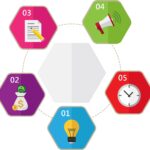Online learning has revolutionized the education landscape, providing learners with convenient access to a wealth of knowledge and resources. In the digital age, it is essential to develop effective strategies for online learning to ensure a productive and successful learning experience. This article will explore various strategies that learners can employ to optimize their online learning journey, enhance engagement, and achieve their desired learning outcomes.

1. Setting Clear Goals
Setting clear goals is the first step toward effective online learning. Define what you want to achieve from the course or program and break it down into smaller, manageable objectives. By having specific goals in mind, you can stay focused and motivated throughout the learning process.
2. Establishing a Dedicated Learning Space
Creating a dedicated learning space can help you establish a conducive environment for online learning. Choose a quiet and well-lit area where you can concentrate without distractions. Set up your study area with the necessary equipment, such as a comfortable chair, a reliable internet connection, and any additional tools required for your course.
3. Time Management
Effective time management is crucial for successful online learning. Create a schedule that allocates specific time slots for studying, attending virtual classes, completing assignments, and reviewing course materials. Stick to the schedule and avoid procrastination to ensure consistent progress in your online learning journey.
4. Active Participation and Engagement
Active participation and engagement are key to maximizing the benefits of online learning. Take an active role in discussions, forums, and interactive activities provided by the course. Engage with your peers and instructors through online platforms, ask questions, and contribute to the learning community. This interaction fosters a deeper understanding of the subject matter and enhances the overall learning experience.
5. Effective Communication
Clear and effective communication is essential in the online learning environment. Utilize communication channels such as email, discussion boards, and virtual meetings to connect with your instructors and fellow learners. Be proactive in seeking clarification or support when needed. Effective communication fosters collaboration, builds relationships, and enhances the learning process.
6. Utilizing Multimedia Resources
Online learning offers a vast array of multimedia resources that can enrich your learning experience. Take advantage of videos, podcasts, interactive simulations, and other multimedia tools provided by your course. These resources can help reinforce concepts, provide real-world examples, and make the learning material more engaging and memorable.

7. Practicing Self-Discipline and Motivation
Online learning requires self-discipline and motivation. Create a study routine and hold yourself accountable for completing assignments and meeting deadlines. Stay motivated by reminding yourself of the benefits and goals you have set for your learning journey. Celebrate small achievements along the way to maintain a positive attitude and drive toward success.
8. Utilizing Learning Management Systems (LMS)
Most online courses utilize Learning Management Systems (LMS) to organize and deliver course content. Familiarize yourself with the features and functionalities of the LMS used in your course. Learn how to navigate through the platform, access resources, submit assignments, and engage in discussions. Utilizing the LMS effectively will enhance your learning experience and streamline your interactions with the course materials.
9. Seeking Support and Building Networks
Online learning does not mean you have to learn in isolation. Seek support from your instructors, course facilitators, or academic advisors whenever you encounter difficulties or have questions. Additionally, build networks with fellow learners through online forums or study groups. Collaborating with others can provide different perspectives, promote knowledge sharing, and create a sense of community in your online learning journey.
10. Regular Assessments and Self-Evaluation
Engage in regular assessments and self-evaluation to monitor your progress and identify areas that require improvement. Take advantage of quizzes, tests, and assignments provided by the course to evaluate your understanding of the material. Reflect on your learning journey, identify strengths and weaknesses, and make necessary adjustments to enhance your overall learning experience.
FAQs (Frequently Asked Questions)
Q1: How can I stay motivated while learning online?
A1: To stay motivated while learning online, set clear goals, celebrate small achievements, maintain a positive mindset, and establish a study routine that keeps you engaged and focused.
Q2: What should I do if I face technical issues during online learning?
A2: If you encounter technical issues, reach out to your course instructors or technical support for assistance. They can guide you through troubleshooting steps or provide alternative solutions.
Q3: How can I manage online learning alongside other commitments?
A3: Effective time management is key. Create a schedule that allocates dedicated time for online learning while considering your other commitments. Prioritize tasks, eliminate distractions, and make the most of the available time.
Q4: How can I improve my online communication skills?
A4: Actively participate in online discussions, practice clear and concise writing, and be respectful of others’ opinions. Seek feedback from instructors or peers to enhance your communication skills.
Q5: What resources can I use to enhance my online learning experience?
A5: Utilize multimedia resources such as videos, podcasts, interactive simulations, and online libraries. Explore external websites, reputable articles, and educational platforms to supplement your learning.
Q6: How can I stay focused and avoid distractions while studying online?
A6: Create a dedicated learning space, turn off notifications on your electronic devices, and use productivity tools or apps that help minimize distractions. Practice self-discipline and establish a study routine.
Conclusion
In the digital age, online learning provides a wealth of opportunities for individuals seeking to expand their knowledge and skills. By implementing effective strategies such as setting clear goals, establishing a dedicated learning space, managing time efficiently, actively participating in discussions, utilizing multimedia resources, and seeking support when needed, learners can enhance their online learning experience and achieve their desired outcomes. Embrace the flexibility and convenience of online learning while staying motivated, disciplined, and engaged throughout your educational journey.




GIPHY App Key not set. Please check settings